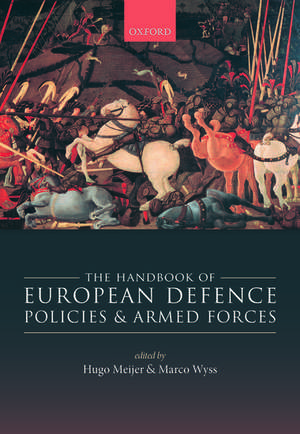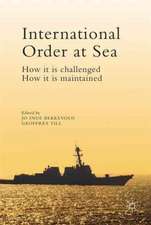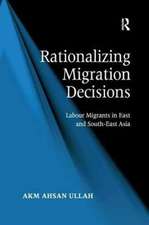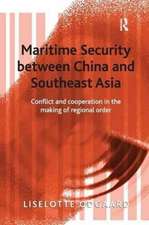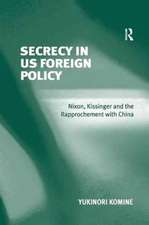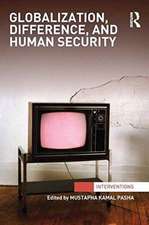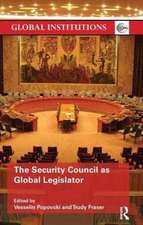The Handbook of European Defence Policies and Armed Forces
Editat de Hugo Meijer, Marco Wyssen Limba Engleză Hardback – 11 iul 2018
Preț: 945.05 lei
Preț vechi: 1323.15 lei
-29% Nou
Puncte Express: 1418
Preț estimativ în valută:
180.86€ • 188.12$ • 149.31£
180.86€ • 188.12$ • 149.31£
Carte disponibilă
Livrare economică 11-17 martie
Livrare express 08-14 martie pentru 144.60 lei
Preluare comenzi: 021 569.72.76
Specificații
ISBN-13: 9780198790501
ISBN-10: 0198790503
Pagini: 1008
Dimensiuni: 178 x 254 x 59 mm
Greutate: 1.92 kg
Editura: OUP OXFORD
Colecția OUP Oxford
Locul publicării:Oxford, United Kingdom
ISBN-10: 0198790503
Pagini: 1008
Dimensiuni: 178 x 254 x 59 mm
Greutate: 1.92 kg
Editura: OUP OXFORD
Colecția OUP Oxford
Locul publicării:Oxford, United Kingdom
Recenzii
Truly comprehensive in scope, with contributions from leading experts, this outstanding collection is an essential primer for anyone seeking to understand the complexities of European defence and security. The mix of national, cross-European, and thematic chapters in one collection is especially welcome and makes it stand out from the existing literature.
As European defence integration has stalled and we are experiencing a return to 19th-century renationalization of large areas of defence, there is a deficit in comparative analyses of security policies and force structures of individual European states. This expert collection combining latest figures with first-rate analysis covers not only most European states but also general subjects such as naval power, cyber defence and intelligence, and the many regional or bilateral initiatives that have sprung up to overcome the limitations of single-state defence capabilities. This essential handbook should be on every security studies scholar and defence practitioner's shelf!'
For reasons of shifts in the global distribution of economic and hence military potential, and rapid domestic political change, international politics suddenly seems to resemble the traditional security and power competitions of the past. Europe is both agent and subject of these changes. Yet the systematic study of security policy in Europe has suffered from a kind of balkanization; some study politics; some study institutions; a few study actual military power and its employment. These subjects are seldom treated comprehensively, or comparatively. This work approaches the study of European security from all of these perspectives, integrates them, and most importantly focuses on the nation states, which remain the locus of European military capabilities, and thus fighting power.'
European defence has become beached by debates which have overlooked its real achievements in some areas as well as its increasing political importance in the wake of Trump and Brexit. This is therefore an important and timely book, which provides both the informed comment which can too often seem in short supply and the substance which ought to underpin it.'
As European defence integration has stalled and we are experiencing a return to 19th-century renationalization of large areas of defence, there is a deficit in comparative analyses of security policies and force structures of individual European states. This expert collection combining latest figures with first-rate analysis covers not only most European states but also general subjects such as naval power, cyber defence and intelligence, and the many regional or bilateral initiatives that have sprung up to overcome the limitations of single-state defence capabilities. This essential handbook should be on every security studies scholar and defence practitioner's shelf!'
For reasons of shifts in the global distribution of economic and hence military potential, and rapid domestic political change, international politics suddenly seems to resemble the traditional security and power competitions of the past. Europe is both agent and subject of these changes. Yet the systematic study of security policy in Europe has suffered from a kind of balkanization; some study politics; some study institutions; a few study actual military power and its employment. These subjects are seldom treated comprehensively, or comparatively. This work approaches the study of European security from all of these perspectives, integrates them, and most importantly focuses on the nation states, which remain the locus of European military capabilities, and thus fighting power.'
European defence has become beached by debates which have overlooked its real achievements in some areas as well as its increasing political importance in the wake of Trump and Brexit. This is therefore an important and timely book, which provides both the informed comment which can too often seem in short supply and the substance which ought to underpin it.'
Notă biografică
Hugo Meijer is Marie Skłodowska-Curie Fellow at the Robert Schuman Centre for Advanced Studies, European University Institute, and the Academic Director of the European Initiative on Security Studies (EISS). His publications include Trading with the Enemy: : the Making of US Export Control Policy toward the People's Republic of China (OUP, 2016), and Origins and Evolution of the US Rebalance toward Asia: Diplomatic, Military, and Economic Dimensions (Editor, Palgrave Macmillan, 2015). He has also published in such journals as the Journal of Strategic Studies, European Journal of International Security and the Journal of Cold War Studies. Marco Wyss is Lecturer in the International History of the Cold War at Lancaster University, an Associate Fellow at the Institute of Commonwealth Studies, and a Fellow of the Royal Historical Society. He is co-editor of the 'New Perspectives on the Cold War' book series (Brill), and the editor of the International Journal of Military History and Historiography. His publications include Arms Transfers, Neutrality and Britain's Role in the Cold War (Brill, 2013), Peacekeeping in Africa (co-authored wtih Thierry Tardy, Routledge, 2014), and Neutrality and Neutralism in the Global Cold War (Routledge, 2016). His articles have been published in such journals as the Journal of Contemporary History, International History Review, Journal of Imperial and Commonwealth History, Cold War History, and the RUSI Journal.
